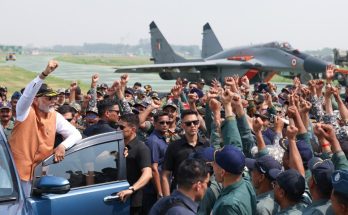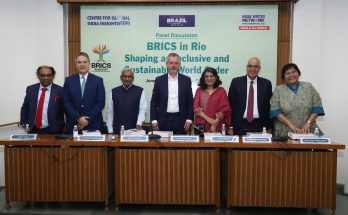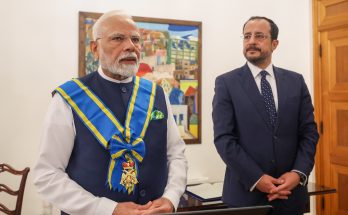The coronavirus pandemic has sparked an unprecedented global crisis and exposed the fragility of international institutions mandated with addressing and mitigating the human tragedy of this magnitude. The death toll is rising every minute even as the world frantically searches for a vaccine that can deliver humanity from this curse. The pandemic is also poised to have significant geopolitical ramifications as the world’s two leading powers trade blame and pundits predict a retreat of globalisation. Currently, there are only overwhelming questions, and no easy answers.
Against the backdrop of a corona-stressed world, India Writes Network and India and the World magazine are pleased to launch an interview series, entitled THE CORONA CONVERSATION, that explores global and diplomatic ramifications of the pandemic with eminent diplomats, experts and thought leaders.

In this interview with Manish Chand, Editor-in-Chief, India and World & IWN, Amar Sinha, a veteran diplomat who handled Economic Relations as secretary in India’s Ministry of External Affairs, argues that India is well placed to play a key role in a new industrial architecture, besides being a proponent of enhanced global cooperation. Sinha, currently a Member of India’s National Security Advisory Board (NSAB) and Distinguished Fellow, RIS, envisions a new global institution that focuses on South-South and trilateral cooperation.
Q & A
Q) In what ways the COVID-crisis will impact the current world order?
A) The best minds in India and from around the world have expressed their views on what the world would look like post-Wuhan Virus (COVID -19) pandemic. It has wreaked unfathomable disruption in global economy and exacted a huge toll of human lives around the world. This tragedy is still unfolding. One thing is clear that it would be not be business as before. What shape this may take is difficult to predict at this moment, but the world would focus on roles of governments, credibility of institutions, including international bodies, and deeply introspect on the cost and benefits of hyper-globalization.
The world will look for more sustainable models of growth with an emphasis on regional value chains. This would lead to multi-polarity, in the global manufacturing since this pandemic proves that extreme dependence entails a huge cost.
Q) What role can India play in mobilising global cooperation in multilateral and plurilateral institutions such as BRICS, SCO and G20?

A) India, as a large democratic country, has multiple roles to play, both globally and regionally. PM Modi has already shown the way forward through cooperation both in the SAARC context as well as in G20. India’s response to requests for supply of critical medicines clearly underlines its commitment to global cooperation. This is a practical manifestation of “SABKA SAATH SABKA VIKAS” that has guided our foreign and domestic policies in the recent years.
India is well placed to play a key role in a new industrial architecture, besides being a proponent of enhanced global cooperation. I envision moves towards a global institution that focuses on South- South and trilateral cooperation; and which ensures that good practices and successes are disseminated and replicated. India can also help refashion some of the global norms and rules that govern IPRs, that define national security or those concerning movement of goods, services and capital. Joint R&D, sharing of knowledge and technology transfers – all merit fresh approaches.
Q) Do you think the coronavirus pandemic will compel the world to move towards a new kind of humane/human-centric globalisation?
A) I am convinced that approaches have to change. Mercantilist ideas and extreme consumerism have run their course. In India, we do not have to look far. One can see the validation of the Indian way of life with emphasis on frugality, hand hygiene, social distancing thorough Namaste or even not allowing outside filth to enter homes along with foot wear. While we see these as our ingrained cultural traits, these are now being demanded by scientists and doctors in the wake of the pandemic outbreak.
While this virus has been a leveller, it has highlighted the sad plight of the vulnerable sections of the society — seniors and aged, people with underlying morbidities, economically less fortunate, health sector workers and also how ill equipped the richest societies were when it came to medical facilities. If the priorities of the Leaders and nations do not change now, this pandemic would become an enduring human tragedy that left behind no lessons.
Author Profile
- India Writes Network (www.indiawrites.org) is an emerging think tank and a media-publishing company focused on international affairs & the India Story. Centre for Global India Insights is the research arm of India Writes Network. To subscribe to India and the World, write to editor@indiawrites.org. A venture of TGII Media Private Limited, a leading media, publishing and consultancy company, IWN has carved a niche for balanced and exhaustive reporting and analysis of international affairs. Eminent personalities, politicians, diplomats, authors, strategy gurus and news-makers have contributed to India Writes Network, as also “India and the World,” a magazine focused on global affairs.
Latest entries
 India and the WorldJune 26, 2025Operation Sindoor: India Sheds Restraint, Rediscovers Utility of Force
India and the WorldJune 26, 2025Operation Sindoor: India Sheds Restraint, Rediscovers Utility of Force India and the WorldJune 23, 2025BRICS summit in Rio to focus on Global South, local currency trade
India and the WorldJune 23, 2025BRICS summit in Rio to focus on Global South, local currency trade Africa InsightsJune 11, 2025New Opportunities in India-Japan Cooperation in Africa
Africa InsightsJune 11, 2025New Opportunities in India-Japan Cooperation in Africa India and the WorldMay 23, 2025Post-Operation Sindoor, India reminds Turkey, China of concerns and sensitivities
India and the WorldMay 23, 2025Post-Operation Sindoor, India reminds Turkey, China of concerns and sensitivities








